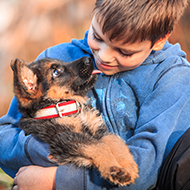
Survey will explore impact of lockdown on puppy buying and welfare
The Royal Veterinary College (RVC) is looking for UK dog owners who have acquired a puppy since January 2019, to take part in a survey exploring puppy buying experiences both before and during the COVID-19 pandemic.
Reports have shown large spikes in UK households purchasing puppies since lockdown began. The 'Pandemic Puppies' survey aims to explore people's puppy buying experiences across this period, looking at how and why they acquired their pet.
The study will also assess the impact that the pandemic has had on the early lives of these puppies compared to those purchased in 2019. As lockdown has reduced opportunities for socialisation and development which are so important for young puppies.
According to the RVC, this research will identify any vulnerabilities to the health, behaviour, and welfare of this puppy population, and will help provide advice and guidance for their owners, as well as future prospective buyers.
The survey is open to UK residents who brought a puppy of any breed or crossbreed home aged under 16 weeks during 2019 or 2020. The puppy must have been purchased from a breeder or private seller, rather than adopted from a rescue organisation or bred by themselves.
Dr Rowena Packer, project leader and lecturer in Companion Animal Behaviour and Welfare Science at the RVC said: “We want to learn more about how and why people bought puppies during lockdown, and your experiences of owning a young puppy during this unprecedented period.
“We want to know about both good and bad experiences, so even if you feel the puppy buying process didn’t go as well as you had hoped, you have worries, or even if you have rehomed your puppy, we would love to hear from you.
“We equally need vital information from owners of puppies bought before the pandemic in 2019 and early 2020, to learn what ‘normal’ puppy buying looked like in the UK.”
To take part in the survey, please click here.



 The latest
The latest